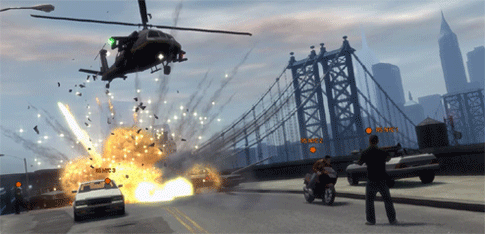GTA IV: Perfect Isn’t Perfect
It may be the biggest hit of the year, but that doesn't mean it won't tick you off

We may earn revenue from the products available on this page and participate in affiliate programs. Learn more ›

You heard the hype, you read the astonishing array of perfect-score online reviews. So you bought a copy of Grand Theft Auto IV, sat down to play and . . . what’s going on here? How can a perfect game be ticking you off? I’m not saying that GTA IV is less than amazing, but it most definitely is less than perfect, particularly if you’re not one of the professional gamers writing those frothing-at-the-mouth-with-delight reviews. Some of the most basic elements in the game are just plain aggravating.
I’m talking controls here, my friends. GTA is often described as a driving and shooting game, but the controls for neither activity approach the level of sophistication and precision that you’d find in a first-class driving game (Burnout or even Project Gotham Racing) or shooter (Gears of War, for example) played on the Xbox 360.
The first problem with driving is that you can’t see where you’re going before making a turn. Antisocial driving is fine if it’s intentional, but plowing into pedestrians and ramming other vehicles simply because you didn’t know they were there is just plain awkward. Yes, you can turn Niko’s head manually, but that’s not practical when cruising at breakneck speeds. And would a rearview mirror have been too technologically taxing to implement? Add the cars’ horrendous turning radius and sloppy handling, and toss in narrow streets with lots of traffic, plus a ticking clock that requires you to drive as fast as possible to complete your mission. Are we having fun yet?
The shooting action is better than in previous GTA iterations, but that doesn’t make it great. You can lock onto a target and never miss a shot, or depress the trigger partway (none too easy during the heat of battle) and use free aim to pick off targets. Good luck with that.
Do you get better at driving and fighting and shooting with practice? Of course, but the action is never as fluid and precise as you’d hope. Then there are the annoying snafus I hit within the first hours of gameplay. For example, I took a young lady to a club, walked in, and could do nothing. There were lots of characters inside, talking and moving around, but nobody acknowledged our presence and nothing happened. Finally, in frustration, I walked outside to leave. Lo and behold, a floating arrow had appeared. By stepping up to the arrow, I was able to make the in-club sequence begin. Say you want to enter a nightclub. Would you look for a mystical arrow floating in space, or just push open the doors and walk in?
Another illogical moment occurred during a heated chase up ladders and across building roofs. Climbing the ladders was enough of a pain—if your position is off by half a step, you can’t climb. Finally, I was about to make a crucial game decision: Do I let my quarry live or push him down to the ground below? Then I realized that I couldn’t move forward to reach him. I’d landed on a small ledge around the building. Not 30 seconds earlier, I’d put my hands up and vaulted over a wall much higher than the hurdle I now faced. But in this case, my only option was to plummet to my own death and play the level again. Arrgh!
If this kind of annoyance came up in a crappy game, I’d just shrug it off. But the enthusiasts aren’t wrong about what’s right with GTA IV. It is an epic game, with a fascinating cast of characters and an extraordinary setting. It’s worth pushing past the parts that lack polish in order to fully experience the exciting story, the over-the-top action and the artistic achievement that is GTA IV. Just understand that, when faced with problems playing this game with a string of perfect ratings to its credit, it isn’t you—it’s the game.